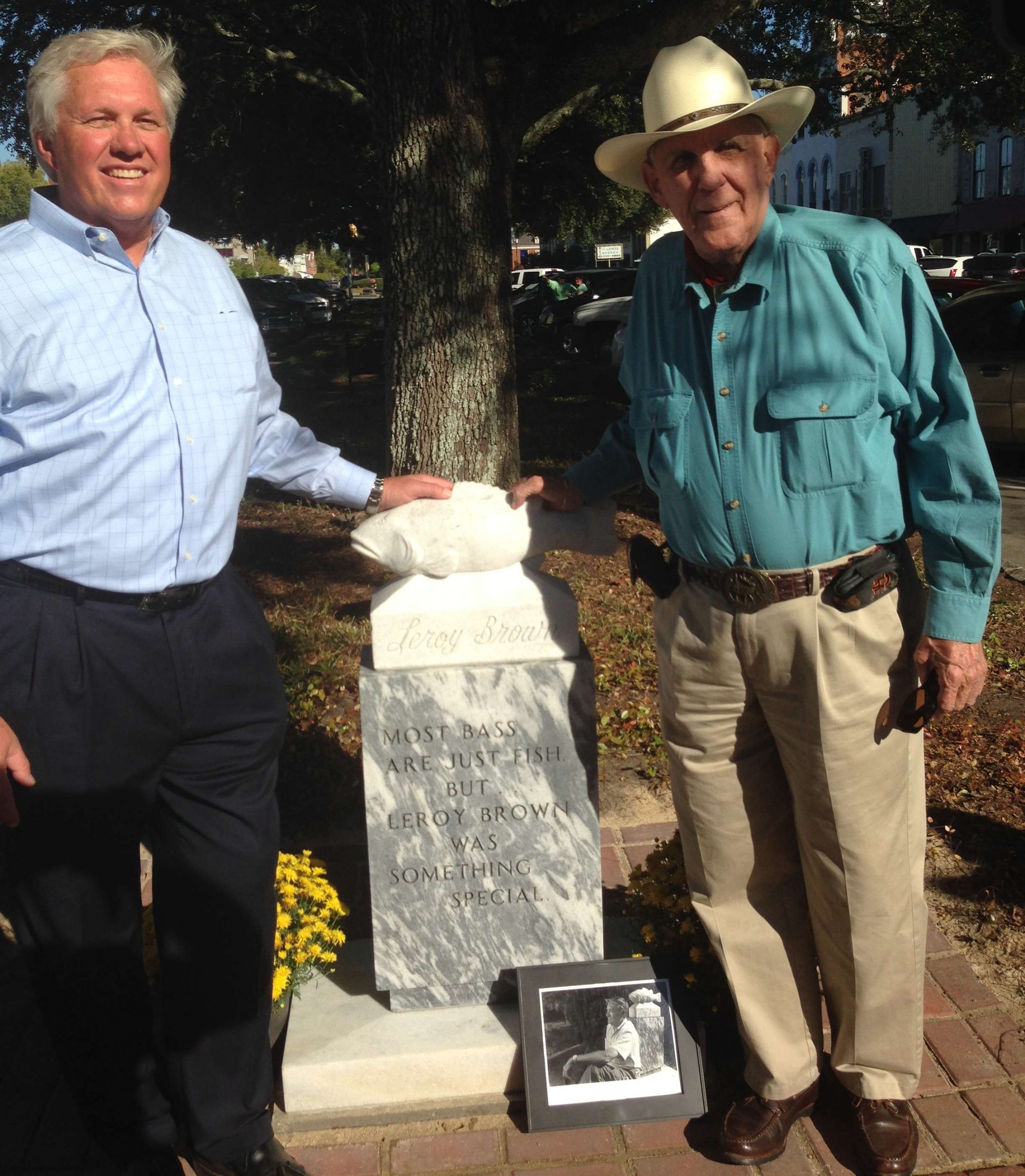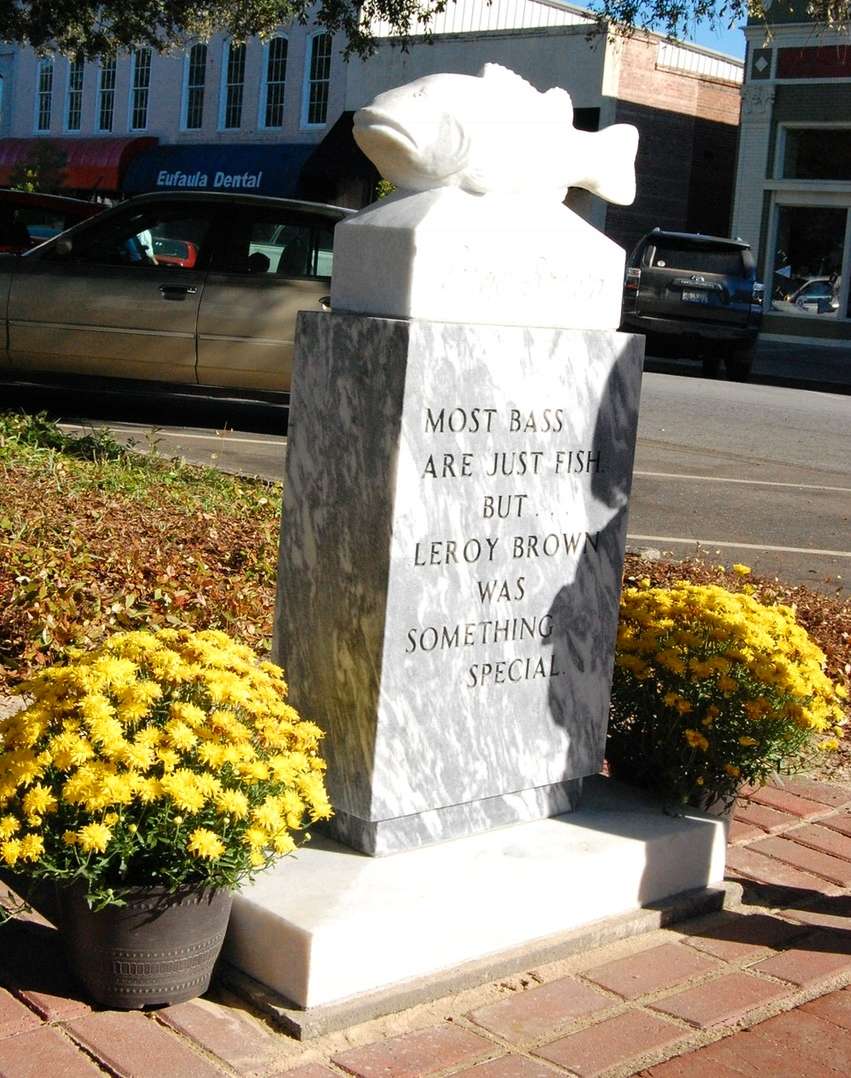
Gone but not nearly forgotten, few actual bass loom as large as Leroy Brown, a largemouth caught by Tom Mann in 1973 from Lake Eufaula on the Alabama-Georgia border. Now, more than 40 years after he was caught and 35 years after his death, Leroy Brown is back in the news. A monument to what may have been the smartest bass of all time became a fixture in downtown Eufaula, Ala., last week.
Tom Mann was already a legend by the time he caught Leroy — the winner of a pair of early B.A.S.S. events, the founder and owner of Mann’s Bait Company and the creator of the Humminbird brand. But a bass would soon eclipse his notoriety.
In his autobiography, Think Like a Fish (Broadway Books, 2002), Mann described his initial encounter with the bass: “I took one look at the fish and felt as if I’d known him personally all my life. It was apparent to me that he had personality. That little bass, more than the hundreds of thousands of others that I’ve caught, changed my life forever.”
Instead of releasing the little bass, Mann took it home and put it in a swimming pool where he kept giant fish. The new entry was the smallest fish there, but he didn’t act like it. Rather than hide from larger predators, he confronted them, forcing bigger fish out of one end of the pool and keeping it for himself and several females. His aggressiveness caused Mann’s wife, Ann, to name the fish “Leroy Brown” after the title character in a number one song that same year by Jim Croce.
And he’s bad, bad Leroy Brown,
The baddest man in the whole damn town.
Badder than old King Kong,
And meaner than a junkyard dog.
Leroy was far tougher than his size would indicate. When Mann caught him, he weighed about a pound, but he was a force to be reckoned with and far brighter than any bass Mann had ever encountered.
“Leroy never again hit a lure with a hook. I had caught him on a hook [a Texas-rigged strawberry Jelly Worm], and that was the last time I’d ever trick him.” What’s more, Leroy did not allow any of the females he courted to strike a lure, either. Mann decided to move Leroy to the 38,000-gallon aquarium he maintained at Tom Mann’s Fish World, a popular tourist attraction in his hometown of Eufaula. Leroy took charge there, too, controlling half the water and only allowing select females to join him during mating season.
Mann knew a good thing when he had it, even if it was just a smallish fish. Since Leroy was obviously far brighter than the average bass, Mann set to work training him — first having him eat minnows from his hand and later getting him to jump through a hoop held above the water’s surface. It thrilled the crowds at Fish World.
In time, Leroy grew to weigh about 6 pounds — large for a male — and became the focus of Mann’s Bait Company’s advertising and marketing, typically receiving more ink than Mann himself. Mann cashed in on Leroy in other ways, too. He learned that if Leroy paid any attention to a prototype artificial, he was onto something. If Leroy ignored it, he went back to the drawing board.
Unfortunately, a bass’ life is relatively short, and Leroy died of natural causes in the spring of 1981. The industry’s most famous fish was gone, but the spotlight wasn’t finished with Leroy. The Eufaula newspaper published an obituary of the fish that was picked up by the major wire services. Telegrams of condolence came in from country music stars Porter Wagoner, Sonny James and Bobby Bare — all avid bass anglers.
And as luck would have it, the B.A.S.S. Alabama Invitational was being held on Lake Eufaula when Leroy died, bringing much of the industry to Eufaula’s doorstep. B.A.S.S. founder Ray Scott delivered the eulogy. B.A.S.S. legends Roland Martin and Hank Parker served as pallbearers. Alabama governor Fob James was in attendance… along with about a thousand other people, who came to Lake Point Lodge to pay their respects. The Eufaula High School marching band played “Bad, Bad Leroy Brown.”
Leroy was laid to rest in a satin-lined tackle box. He was buried behind Fish World. The bereaved laid flowers and fishing lures on his grave.
But the famed fish had one more headline in him. During the night, ghouls stole Leroy’s coffin and left a ransom note demanding $10,000 for its return. The story was picked up all over the country. Mann prepared to pay the demand, but the graverobbers were silent.
A couple of weeks later, a call came from the baggage claim office at the Tulsa, Okla., airport. They had found Leroy. The smell of his decomposing body had given him away.
The perpetrators were never caught.
In his autobiography, Mann wrote that Leroy’s body (sans the satin-lined tackle box) was returned “in a plastic Baggie,” but in an interview he told me that the body was discarded by airport personnel in Tulsa. They had no interest in returning a decomposing fish carcass.


Mann spent $4,000 on a monument to Leroy that stood behind Fish World for more than 20 years. The inscription reads,
Most bass are just fish,
But Leroy Brown was something special.
Today, Tom Mann and Fish World are long gone. Mann died in 2005. Fish World was replaced by a convenience store and swimming pool supply business. The alligators that once drew crowds are still evident behind a high fence in the back, but there’s no sign of the giant aquarium or anything to do with Leroy Brown.
Mann, who once had millions, died with little. To help his widow, Ray Scott paid $5,000 for the Leroy Brown monument — a fair price for a headstone dedicated to a bass that’s been mostly forgotten.
For a decade, the Leroy Brown monument sat in Scott’s front yard at his Legacy Lakes property in Pintlala, Ala. But recently, the City of Eufaula made a request of Scott. They wanted the Leroy Brown monument back in the city, and Scott acquiesced. It is now displayed on one of Eufaula’s main thoroughfares.
“Leroy Brown was everything I admired in the bass,” Scott said, talking as much about his respect for the species as for the individual. “He was tough, smart and independent. I’m glad the City of Eufaula has an interest in the history of this special fish and that visitors will have a chance to see the monument. Leroy Brown truly was something special.”

